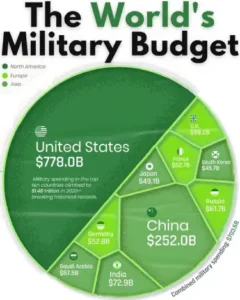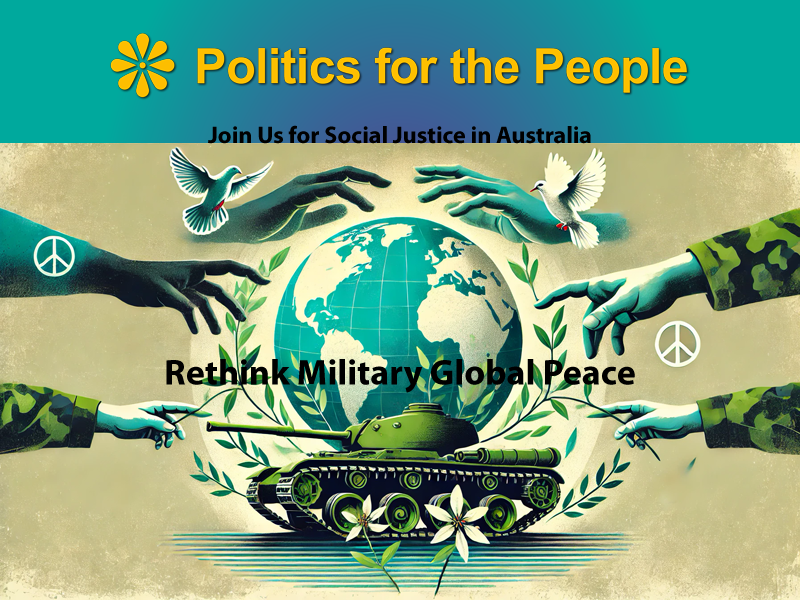Introduction
The term “military-industrial complex” (MIC) was first coined by U.S. President Dwight D. Eisenhower in 1961, illuminating the concerning symbiosis between a nation’s military and its defence industry. This partnership, initially recognized for its role in national security, has morphed into a formidable force with significant sway over national policies and international relations. Understanding the MIC is crucial for grasping how certain global dynamics are perpetuated and how they might be redirected towards more peaceful outcomes.
The Role of MIC as a Weapons Supplier and Political Force
The Economic and Political Power of MIC

The military-industrial complex stands for a significant intersection of economic interests and political power. It is not just about supplying arms; it’s about fostering an ecosystem that benefits enormously from continuous military spending. In the U.S., this complex ensures its survival through contracts worth billions of dollars, tailored to develop sophisticated weaponry and technology. This financial influence extends to creating thousands of jobs, thus embedding the MIC deeply within the economic fabric of the country.
MIC’s Influence on Public Policy
The MIC wields its influence through extensive lobbying efforts and its entrenched relationships within the corridors of power. By funding political campaigns and employing a cadre of former military and government officials, the MIC ensures that its interests are well-represented. This results in substantial budget allocations for defence spending and a foreign policy that often favours military intervention over diplomatic solutions. The consequences are far-reaching, affecting global peace and stability.
The Cycle of Never-Ending Wars
Lobbying for Interventionism
One of the most insidious ways the MIC perpetuates its relevance is by advocating for a foreign policy that emphasizes interventionism. Through substantial lobbying efforts, the MIC aligns itself with key policymakers, think tanks, and media outlets to promote an aggressive stance on international issues. This strategy ensures continuous demand for military deployments, operations, and, so, supplies from the defence sector.
Exploiting Natural Resources
Supporting Multinational Corporations
In regions rich with oil, gas, and minerals, the MIC plays a critical role by securing corporate access to these resources. It provides the necessary military support to protect these corporate interests, often at the cost of overriding local governance and societal norms. This support extends to intelligence and strategic planning, ensuring that any resistance from local governments or communities can be effectively managed or quelled, often under pretexts like promoting democracy or protecting human rights.
The Threat to Peace, Democracy, and Human Rights
The pervasive influence of the MIC poses significant threats not just to peace and stability but also to the democratic processes and human rights in conflict zones. The prioritization of military solutions results in widespread destruction, civilian casualties, and the erosion of civil liberties. Additionally, the environmental impact of these military activities is profound, contributing to pollution, habitat destruction, and climate change, further worsening global environmental crises.
Conclusion: The Call for a Paradigm Shift
The military-industrial complex has grown into a formidable force that shapes much of global policy and economic landscapes. Challenging its power and influence is not just about promoting peace; it’s about ensuring a sustainable future where human rights and environmental health are prioritized. It is imperative for policymakers, activists, and the global community to advocate for significant reforms.
Questions to Consider
1. What practical steps can be taken to reduce the influence of the MIC in government policy?
2. How can public awareness and education play a role in demystifying the operations of the MIC?
Call to Action
We must support movements and initiatives that look to curb the influence of the MIC. Engage in public discourse, educate yourself and others about the implications of unchecked military power, and vote for leaders who commit to transparency and reduced military spending.
References:
https://www.britannica.com/topic/military-industrial-complex
https://www.theatlantic.com/magazine/archive/2011/01/the-tyranny-of-defense-inc/308342/
https://pages.uoregon.edu/kimball/MIC.htm
https://en.wikipedia.org/wiki/Perpetual_war
https://countercurrents.org/2023/05/is-the-military-industrial-complex-not-just-the-means-but-also-an-important-cause-of-forever-wars/
https://www.intechopen.com/chapters/74129

